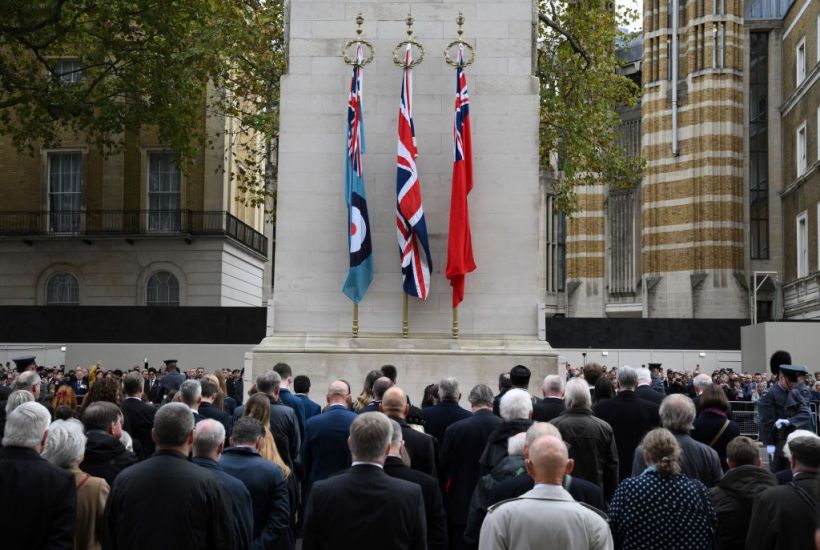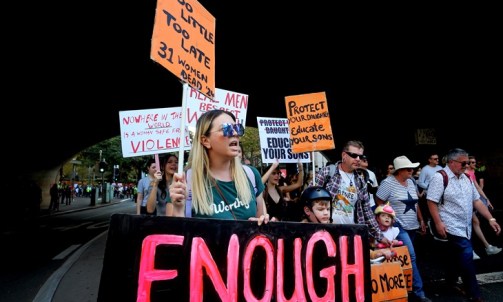It was exceptionally cold, that strange Armistice day. I was used to spending the two minutes silence squinting into the winter brightness at college memorials or in English country church yards. Mid November is rarely freezing cold in the UK: it is often cold and crisp, the temperature is just enough time to stand outside whilst sunlight dances on stone memorials. Prague, however, where I spent that strange Armistice day a decade ago, is very different. Eleventh November is the feast day of St Martin of Tours, the patron saint of soldiers and the Czechs have a saying which alludes to the typical Central European weather on Armistice day: ‘St Martin comes riding a white horse’.
Snow did indeed fall that day. I, only a student, stood alongside various ambassadors, military attaches, oddly exiled Anglican clergy, tech entrepreneurs and men who had married Czech wives during the republic’s great awakening to the stag do in the 1990s. The corner of the Olšany cemetery given over to Commonwealth War Graves is immaculately kept. Near the florid tombs from the high water mark of Habsburg Catholicism in the rest of the cemetery, and the brutal simplicity of the slabs from the long decades of Communist rule, there is a row of simple war graves as might be found in a country churchyard in Camarthen, Cork, Caithness or Kent.
A corner of a foreign field, forever England. And Australia, India, Canada, and the Caribbean. For standing in the snow weren’t only Brits, but representatives from across the Commonwealth. Most of those we remembered were POWs, taken to what was then at the heart of Germanic Europe for safekeeping and to die. Some of those who were there representing their nations had only one or two countrymen lying beneath the Bohemian soil. Some had none at all. Yet, in a Babel-like fusion of accents and inflections we declared as one ‘we will remember them’.
Since then I have led more Remembrance services than I can myself remember. That would be a surprise to clergy of the previous generation. Even 20 years ago, the accepted truth in Church circles (not, I grant you, normally places where wisdom makes her dwelling) was that Remembrance was a dying festival, soon to follow the Churching of Women and Touching for the King’s Evil. Fast forward two decades and Remembrance Sunday is, in many churches, the best attended Sunday of the year. The reasons are debated: was it Blair’s wars, the loss of global power or simply the need for unifying rituals amidst political flux that resurrected Armistice day? Or perhaps, people simply remembered that it mattered.
Some clergy, generally of an older generation, who did their training in the dogmatically progressive theological aftermath of the 60s revolution, grumble about this. Armistice day is not a Christian celebration, they say. It glorifies war, it reinforces tropes of empire and establishment. But there is bad theology attached to every moment in the Church’s calendar – and the misconceptions around Remembrance are a walk in the park compared to, say, Christmas or Halloween. And, of course, what is marked on Remembrance day is always inclusive in a truly expansive sense; in the way that only death can be. In truth, I think Remembrance a deeply moving festival, rooted in innumerable Christian concepts. It not only addresses clear pastoral need – which, some clergy forget, is rather the point of ordained ministry – but also speaks of the wicked folly of humanity, suffering, sacrifice, and of paying the price for that in which we believe.
Some clergy really knew what that price entailed. Some even went as far as to pay it. The Church’s role in both world wars is a cause for sombre reflection; often it was complicit in their horrors. There were, however, a few lights who shone in the darkness. A few miles away from Olšany stands Prague’s Orthodox Cathedral. It’s a modest building but has a place in history. It was here, in the crypt, that the Czechs trained by Britain to participate in Operation Anthropoid – the assassination of Reinhard Heydrich – met their end. They had been sheltered there by the church’s priests, who felt they had a role in defeating evil.
Eventually, the Nazi authorities tracked them down and after their deaths, retribution began. The Church’s Bishop, a man called Gorazd, contacted the Nazi authorities himself, claiming that he alone took responsibility. He was a short, squat, bookish little man with bad eyesight; an unlikely mastermind of the war’s most audacious assassination. In fact his aim had been to sacrifice himself to avoid reprisals against his congregation. For his bravery, he paid the ultimate price and was taken to the Kobilisy Shooting Range, a little to the north of the Olšany cemetery and shot.
Back to the Prague of today. A friend there, Czech to his bones ‘baptised by the Vltava’ as they say, would always wear a poppy around mid-November. When I was younger and more idealistic and, frankly, ruder, I challenged him on it: why do that? Why mark it as a Czech? Surely, to reverse Chamberlain’s calumny, Britain for most Czechs was ‘a far off land of which we know nothing’? Why mark the deaths of men who didn’t know what they were fighting for? I recall that he gave me an indulgent and kind smile, and said, ‘ah, but we did know what they were fighting for’.
Distance – geographical and temporal – makes forgetting easier, and that is as true of global or continental tragedies as it is for personal ones. Remembrance is a privilege as much as a duty: for many the cycles of suffering and sacrifice are lived daily. Let us hope that, as Europe and the world teeter on innumerable potential catastrophes, that we can be granted the grace to keep remembering.
The post Why Remembrance is a privilege as much as a duty appeared first on The Spectator.
Got something to add? Join the discussion and comment below.
Get 10 issues for just $10
Subscribe to The Spectator Australia today for the next 10 magazine issues, plus full online access, for just $10.



















Comments
Don't miss out
Join the conversation with other Spectator Australia readers. Subscribe to leave a comment.
SUBSCRIBEAlready a subscriber? Log in